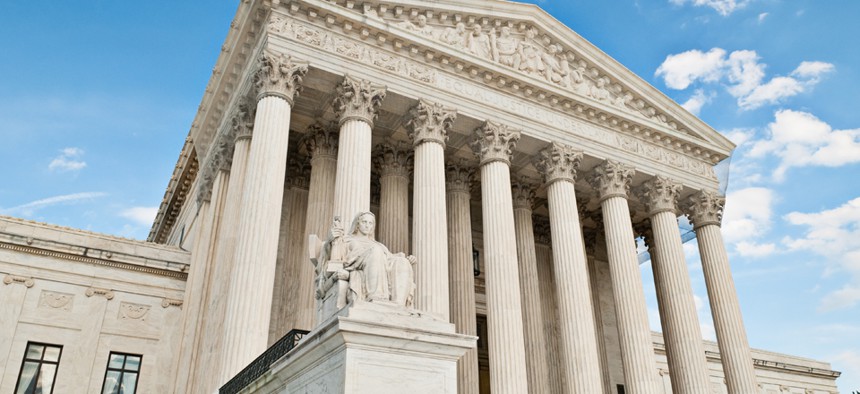
Cameron Whitman/Shutterstock.com
The Supreme Court Just Dealt a Devastating Blow to Public Unions
Mandatory public union dues violate some members' First Amendment rights, court rules.
The Supreme Court ruled in a 5-4 decision on Monday that mandatory public union dues violate some members' First Amendment rights.
In the ruling on Harris v. Quinn, Justice Samuel Alito wrote that the precedent that had upheld the state of Illinois' right to require membership dues was shaky.
The issue at hand in Harris v. Quinn involves Pamela Harris, a home caregiver in Illinois who takes care of her disabled son. Harris is among home caregivers who have decided not to unionize through the Service Employees International Union, opting instead to bargain directly with the Medicaid recipients who decide how much money to allocate to their caregivers.
In the ruling, Justice Samuel Alito wrote that the precedent that had upheld the state of Illinois' right to require membership dues was shaky. The court's precedent on public unions, a 1977 case called Abood v. Detroit Board of Education, found that non-union members may be required to pay membership dues in exchange for collective bargaining.
"Abood itself has clear boundaries; it applies to public employees. Extending those boundaries to encompass partial-public employees, quasi-public employees, or simply private employees would invite problems," Alito wrote. "If we allowed Abood to be extended to those who are not full-fledged public employees, it would be hard to see just where to draw the line, and we therefore confine Abood's reach to full-fledged state employees."
The case posed a challenge to so-called "fair-play fees," which allow unions to collect dues from employees who aren't in the union but who still benefit from the bargains unions strike with employers.
In the case of public-sector unions, though, the employer is the government. And for that reason, the challengers in Harris argued, the unions' collective bargaining is inherently a political activity—they're essentially lobbying the government.
The challengers said allowing public-sector unions to collect fair-play fees is therefore requiring non-union employees to support political activities they don't necessarily agree with—a violation of their First Amendment rights.
Monday's ruling means that hundreds of thousands of home caregivers—in Illinois and in other states—will be free to stop paying membership dues, as they are effectively no longer considered public employees.
In her dissent, Justice Elena Kagan called Alito's comments "gratuitous" and "mistaken." She wrote that the Abood decision provided more than enough basis to uphold Illinois' law."
As The Washington Post's Lydia DePillis explains, GOP backers were friendly to Harris' cause:
Preserving her own right to not support a union, though, wasn't enough for Harris. With the help of the National Right to Work Coalition, an anti-labor group backed by large donors like the Koch and Walton families, she challenged the state's right to designate a union of public employees as their their sole representative. The right has been well settled in case law stretching back to the 1970s, and Harris lost in lower courts. But the Supreme Court took the case, indicating it might be willing to revisit the precedent.
Public sector unions have suffered many setbacks over the past few years—right-to-work laws in states like Michigan and Indiana have drastically limited unions' ability to require members to pay dues. And in 2011, Wisconsin Gov. Scott Walker set off a political firestorm when he stripped state workers of their right to bargain collectively.
The phrasing of Monday's ruling might ultimately be more troubling for public-sector unions than the outcome itself. Alito wrote that the challengers in this particular case weren't truly government employees, so the court's past decisions on public unions didn't apply.
Although that doesn't directly chip away at the court's earlier protections for purely public unions, Alito also said the court's precedent relied on "questionable foundations"—a sign that the court's conservatives might be willing to chip away further at public-sector unions in the future.
There may be one silver lining for public unions, though. The Harris v. Quinn ruling is somewhat narrowly tailored to home caregivers, known as PAs.
"PAs are much different from public employees," Alito wrote. "Unlike full-fledged public employees, PAs are almost entirely answerable to the customers and not to the State, do not enjoy most of the rights and benefits that inure to state employees, and are not indemnified by the State for claims against them arising from actions taken during the course of their employment. Even the scope of collective bargaining on their behalf is sharply limited."
The Harris decision is more than just another instance of union setbacks, though. It's also yet another win for conservatives who have been trying to use the First Amendment to push their causes.
From campaign finance law (Citizens United) to the Affordable Care Act's contraception mandate (Hobby Lobby), the First Amendment has become the GOP's ironclad defense against government regulations. TheHarris v. Quinn ruling just added another plate to the GOP's armor.
(Image via Cameron Whitman/Shutterstock.com)






